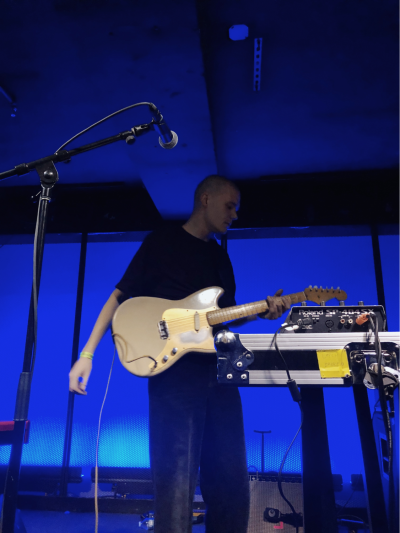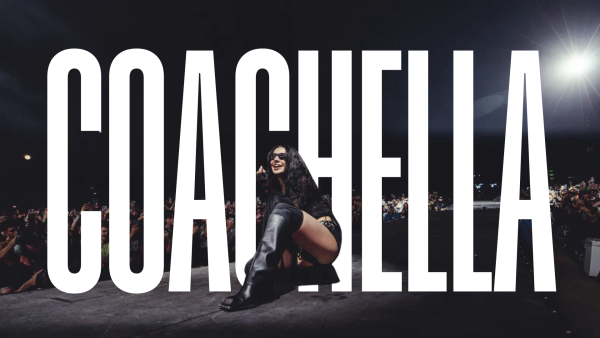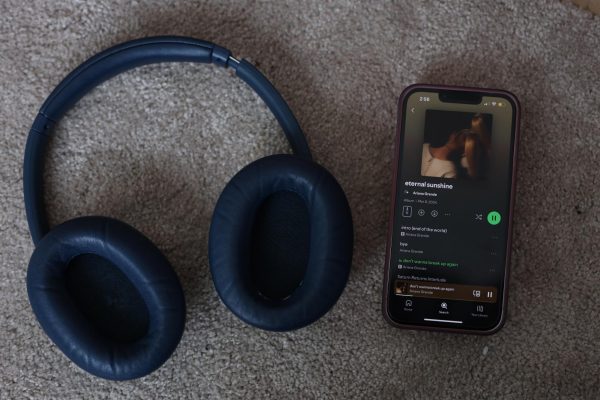The Fordham Ram Speaks with Electronic Folk Powerhouse, Westerman

Westerman takes the stage.
By Olivia Nangle
On a Tuesday night you would normally find me doing some last minute cramming, but when Westerman announced his first New York show, I knew the academic grind could wait.
The Zone One venue was absolutely packed, with fans patiently waiting for the “Confirmation” singer to take the stage. Brooklyn-based artist True Blue (and bassist for Porches) kicked off the night with her intriguing synth-heavy, alt-pop sound. Though her music is reminiscent of a soft lullaby, True Blue kept the audience captivated with her performance. Spitting water into the crowd then later walking around the venue blindfolded kept them on their toes.
Westerman took the stage next. Backed up by piano and bass, he played a combination of both old and new songs. My personal favorites were “Roads” from Call and Response and “Easy Money,” a soft, infectious pop single released earlier this year.
Though his sound does not provide much to get riled up about, the crowd was ecstatic to see Westerman play his first show in the U.S., and his performance exceeded all expectations. His stage presence was intoxicating, and his show proved his deeper cuts to be just as excitable.
Westerman is far from your average folk singer. He dabbles in new-age, electronic-infused folk and his singles, with help from producer and friend Bullion, have made waves in the DIY scene, offering a fresh perspective on exploring sounds and technology within the folk genre. He has been praised as an artist on the rise from publications like The Fader, Pitchfork and Stereogum, and continues to prove his potential through his inimitable stage presence.
Will Westerman emphasizes that he makes honest pop songs for those who want to feel and do so deeply. His latest release Ark is emphasized by synthy, electronic flare with strong folk roots. The Fordham Ram had the opportunity to chat with Westerman about his U.S. shows in New York and L.A., dreams of collabing with Frank Ocean and the importance of authenticity in the songwriting process.
The Fordham Ram: I read that you had written Ark within just a few days, can you tell me a little bit about that?
Westerman: I just had this really small period of time between playing shows, and was alone in my house. I started writing and had this intense period of creativity and melodic movements. I wanted to record another couple of songs but I knew there were more than one or two songs there so I wanted to keep it together. There are other bits from that period that didn’t make it onto the record but I’m really happy with those four songs.
TFR: What’s a typical day like for you in your creative process?
W: I used to have a lot of time to myself to write and think, but now it’s a bit different and there’s more time sensitivity. I like to walk around London, watching and thinking. Often it’s best for me to work at night when it’s quiet. I go away a lot to try to write. My dad lives in Italy now in the middle of nowhere so I go there sometimes to try and order stuff because I need quiet. There’s not really method I don’t think, and if there is I wouldn’t really want to know.
TFR: Why don’t you have as much time anymore?
W: I’ve just been traveling much more and there’s a lot more I have to do with the music. My producer moved to Lisbon so I’ve been there quite a lot. I played more shows this year than I’ve ever played before. I’m quite bad at procrastinating so it’s a combination of having less time and me being quite good at daydreaming and wasting it.
TFR: I know Bullion is now your producer. How does your electronic aspect impact your sound?
W: They’re more aesthetic principles. They’re not fundamentals of the music, it’s more of a framework. What’s nice is when you’re working on more modest budgets, you have access to such a massive array of sounds. You can be more explorative in the way you frame what you say and what you’ve written. I don’t think I’m tied to electronics though.
TFR: Tell me a little bit about your Beatrix Blase directed music video for “Outside Sublime.”
W: I wanted to incorporate some sort of AI or otherworldly thing into it. I did some stuff with a green screen in a while back and it got me thinking that it would be nice to try to create an alternate reality. A lot of my writing has an escapist element, and I wanted that to be brought out in the visuals. I got the pitch for that video, and I let Beatrix construct what her impression was and what she saw. I’m a big fan of letting someone interpret the song with a bit of guiding.
TFR: Who is an artist that you would love to collab with?
W: I would like to work with Frank Ocean, that would be pretty cool. He’s just amazing. I’d be interested in being a fly on the wall and get inside the process of how he puts his stuff together. My biggest influence when I started writing was Neil Young, and I think my dad would be pretty happy if I ever managed to do anything with him.
TFR: Did you see that Frank Ocean recently made his Instagram public?
W: I did not, I don’t actually follow anyone on Instagram (laughs). That’s really cool, though. I think having a genuine Instagram is the right way to do it, it’s much less cynical. I think that’s one of the things I like about him. I feel like there’s a genuine sentiment in the way he makes his music. It’s heartfelt music, and that’s my favorite.
TFR: I think in a similar regard, your music is heartfelt too. I feel as though your listeners can feel the authenticity of your music when they listen.
W: I do try and make it genuine because I feel as though music should be an emoting thing from a human being trying to make a connection with another human being. That’s how I’ve always heard it because that’s the music I like listening to. There’s that element to it so I try to keep to that as well.
TFR: Do you think the music industry is headed more in that direction?
W: I think the industry in a broader sense does not make sense in the way it used to. There’s a lot of pockets. You have your big mainstream type of artists, and that’s more of a collective commercial enterprise than a person writing about how they feel, but then you have a lot of subsets that aren’t like that, so I would say it’s pretty diverse now.
TFR: How does the literature you read influence the music you make?
W: Not so much in terms of narrative but in terms of the principles I try to construct. I try to whittle down what I’ve written to the most condensed way I can put the message across. I find you can do that when you have time to edit and what not. It’s definitely a principle I try to take forward. The authors and books I write try to lock in on universal properties that people can understand that are not too specific, and it’s a vehicle to say something which is a more human thing that people can understand. It’s definitely something I try to hit on when I make music.
END
If you’re a self-proclaimed “Westerstan” like me (yeah, I just made that up), make sure to check out Westerman’s latest EP Ark and be on the lookout for new releases in 2019.
Westerman’s Instagram: @westermanmusic











































































































































































































Gail Silverberg • Dec 27, 2018 at 4:58 pm
BRILLIANT INTERVIEW.🌟amazing music🎶🌻